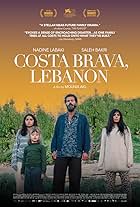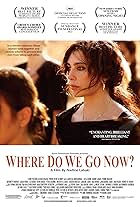Arzé, a single mother, takes her teenage son on a journey across sectarian Beirut in search of their stolen scooter, their only source of livelihood.Arzé, a single mother, takes her teenage son on a journey across sectarian Beirut in search of their stolen scooter, their only source of livelihood.Arzé, a single mother, takes her teenage son on a journey across sectarian Beirut in search of their stolen scooter, their only source of livelihood.
- Awards
- 1 win & 5 nominations total
Betty Taoutel
- Layla
- (as Betty Taoutal)
- Director
- Writers
- All cast & crew
- Production, box office & more at IMDbPro
Storyline
Did you know
- TriviaArzé means Cedar (as in Cedar of Lebanon) which is a common name for a womaan in Lebanon.
Featured review
Director Mira Shaib's Arzé is a cinematic triumph in simplicity, infusing humor and heart into a poignant exploration of Lebanese society's deep-seated complexities. What begins as a straightforward quest to recover a stolen scooter unfolds into a layered narrative about identity, division, and resilience, making it a rare gem in contemporary Arab cinema.
At its core, Arzé uses the Lebanese societal structure as a lighthearted canvas to discuss sectarianism without overwhelming the viewer. The story cleverly weaves humor into the gravity of the subject, portraying how each community blames the other, reflecting deeply ingrained biases. The brilliance lies in its comedic lens-turning stereotypes into moments of self-reflection for its audience.
The filmmaker skillfully portrays the cultural distinctions between the clans through meticulous attention to detail. Beyond each group using a different name for a scooter, their unique identities are further emphasized through clothing styles and dialects, painting a vivid picture of societal diversity. This deliberate layering of visual and linguistic cues enriches the narrative, subtly showcasing how these differences shape perceptions and interactions among the communities.
The film's narrative symmetry is masterful. The return to the gift shop acts as a narrative anchor, launching Arzé's journey and tying together her smaller missions. Every scene, including the unforgettable pierce-stealing moment, is meticulously timed, offering insights into her growth as a character. What starts as a mission to recover her livelihood morphs into a confrontation with the parts of her life she has avoided. This progression, where Arzé faces the truths she has long surrendered to, is both cathartic and empowering played gracefully and brilliantly by Diamand Bou Abboud
Visually, Arzé shines with smartly framed shots. Close-ups expose the psychological tension of its characters, while medium shots emphasize the socio-cultural dynamics of each encounter. The adventure highlights the absurdity of small, yet telling, cultural details-like how each clan uses a different name for a scooter, and their conflicting pride or disdain for the item.
The pies in Arzé are a stroke of genius, doubling as a currency and a symbol of human connection. They underline how survival and negotiation transcend money in communities deeply divided yet intricately intertwined. Similarly, the set design-the outdated fan and telephone-evokes a timelessness rooted in either financial constraints or cultural inertia.
Arzé also breaks new ground for Arab cinema as a feel-good movie. Eschewing grandiose tales of riches or redemption, it celebrates the small victories of everyday life. Its mundane triumphs-the kind that don't change lives but make them more bearable-are a refreshing departure from the typical narratives of struggle and success.
The film's ending, though it's arguably predictable, is executed with grace. It's the kind of closure that feels earned-satisfying yet subtle. Shaib's wisdom as a filmmaker shines here, proving that a predictable ending can still resonate deeply when handled with care and intentionality.
Adding authenticity, the actors are cast from the communities they represent, grounding the film's comedy in lived experiences. The subtle nod to The Bicycle Thief enhances its universal appeal while placing it firmly within the tradition of socially conscious filmmaking.
At its core, Arzé uses the Lebanese societal structure as a lighthearted canvas to discuss sectarianism without overwhelming the viewer. The story cleverly weaves humor into the gravity of the subject, portraying how each community blames the other, reflecting deeply ingrained biases. The brilliance lies in its comedic lens-turning stereotypes into moments of self-reflection for its audience.
The filmmaker skillfully portrays the cultural distinctions between the clans through meticulous attention to detail. Beyond each group using a different name for a scooter, their unique identities are further emphasized through clothing styles and dialects, painting a vivid picture of societal diversity. This deliberate layering of visual and linguistic cues enriches the narrative, subtly showcasing how these differences shape perceptions and interactions among the communities.
The film's narrative symmetry is masterful. The return to the gift shop acts as a narrative anchor, launching Arzé's journey and tying together her smaller missions. Every scene, including the unforgettable pierce-stealing moment, is meticulously timed, offering insights into her growth as a character. What starts as a mission to recover her livelihood morphs into a confrontation with the parts of her life she has avoided. This progression, where Arzé faces the truths she has long surrendered to, is both cathartic and empowering played gracefully and brilliantly by Diamand Bou Abboud
Visually, Arzé shines with smartly framed shots. Close-ups expose the psychological tension of its characters, while medium shots emphasize the socio-cultural dynamics of each encounter. The adventure highlights the absurdity of small, yet telling, cultural details-like how each clan uses a different name for a scooter, and their conflicting pride or disdain for the item.
The pies in Arzé are a stroke of genius, doubling as a currency and a symbol of human connection. They underline how survival and negotiation transcend money in communities deeply divided yet intricately intertwined. Similarly, the set design-the outdated fan and telephone-evokes a timelessness rooted in either financial constraints or cultural inertia.
Arzé also breaks new ground for Arab cinema as a feel-good movie. Eschewing grandiose tales of riches or redemption, it celebrates the small victories of everyday life. Its mundane triumphs-the kind that don't change lives but make them more bearable-are a refreshing departure from the typical narratives of struggle and success.
The film's ending, though it's arguably predictable, is executed with grace. It's the kind of closure that feels earned-satisfying yet subtle. Shaib's wisdom as a filmmaker shines here, proving that a predictable ending can still resonate deeply when handled with care and intentionality.
Adding authenticity, the actors are cast from the communities they represent, grounding the film's comedy in lived experiences. The subtle nod to The Bicycle Thief enhances its universal appeal while placing it firmly within the tradition of socially conscious filmmaking.
Details
- Runtime1 hour 30 minutes
- Color
Contribute to this page
Suggest an edit or add missing content



















